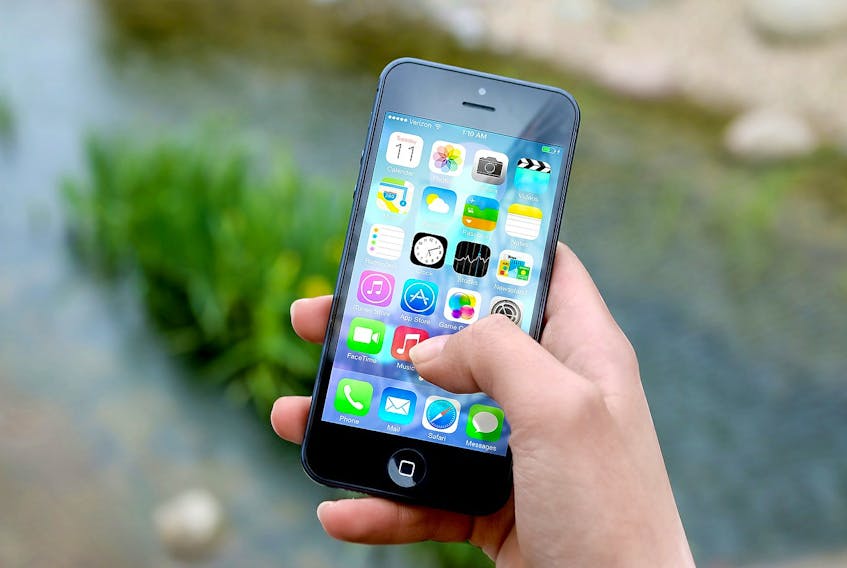SACKVILLE, N.B. — Middle school students in the Tantramar region are going unplugged this year.
Marshview Middle is banning the use of smart phones and other personal gaming devices at the school this year, as administrators attempt to mitigate the impacts of cell phone use on students’ mental health.
“We are seeing a rise in anxiety and mental health concerns in this age group and want to be proactive in our community,” said MMS principal Heather Dixon.
Dixon said she and her staff are excited about a trial year without phones and personal gaming devices. She said research from national studies are suggesting there is a really significant impact on the quality of learning that goes on in the classroom – not only for the students but for the teachers – when smart phones and social media use are restricted.
Dixon said the middle school years can be challenging times for our youth and cell phones are simply adding to the social pressures in their lives.
“We want kids to have fun being kids a little longer,” she said.
Many adolescents are spending way too many hours snapchatting, instagramming and catching up on YouTube, said Dixon, instead of playing outdoors, spending time with friends, reading books and hanging out with family.
Teachers, PSSC in favour of new cell phone policy
The issue was brought to the members of the Parent School Support Committee last year for their consideration and Dixon said they were supportive of restricting the use of cell phones.
“Our PSSC felt strongly that this was the direction to go.”
Dixon also brought the suggestion to the teachers, who were also very much in favour of rolling out this new policy.
A number of parents have also jumped on board to congratulate the school for the move.
“So far, our community has been incredible,” said Dixon. “Many parents have reached out to applaud Marshview for taking this direction. I am so appreciative of the support given to our school across the board.”
Andrew Wilson, a member of last year’s PSSC at the school, said he wasn’t surprised to hear Marshview wanted to trial this policy given the current challenges teachers and administrators face each and every day in the classroom.
“Smart phones are so entwined in our lives it’s hard to believe that the first Apple iPhone arrived on the scene as recently as 2007,” he said. “While most of the students in Marshview have grown up with this technology, it is still relatively new. And the fact is that we don't really know the full impact smartphones and social media have on learning and socializing at school but we have been hearing of studies with results that are cautionary.”
Jury still out on benefits, harmful effects of cellphone use
Wilson, also chair of Sackville 20/20, a local organization focused on bringing more community-engaged learning practices to area students, said he believes this will be a good way to explore how things might be different if phones and social media access are removed from the school day.
“More and more, schools are discovering that the impact learning environments have on the education of our children is as significant as the curriculum and content,” he said.
Wilson pointed out, however, that children only spend about 20 per cent of their overall time at school and so smart phone policies might have a rather minimal impact. At the same time, school could turn out to be the best place to determine the impact technology is having on learning and socialization, he said.
“At the end of the day, I defer to the Marshview community to weigh these complex issues and decide what the best course of action might be.”
Marie Reinsborough-Wadden and Krista Royama, counselling therapists with Iris Community Counselling in Sackville, say the conversation around the struggles and even the possible benefits of smartphone usage for youths is a complicated one.
“It is hard to find the ‘truth’ in the chorus of opinions from smartphone users, parents, researchers, educators, counsellors, and a variety of other well-intentioned perspectives,” they said in a shared statement.
Both counsellors say it can be challenging to find the right advice to offer to our children as they learn to navigate their own life as smartphone users. And as their popularity increases along with the social media platforms they offer, it’s difficult to know how to incorporate them as education or communication tools in a healthy, productive and mentally fit way.
It’s important to keep communication lines open with our children, they say, and provide key psychoeducational information to students along with modeling healthy practices as smartphone-using adults. Using them can become addictive so setting healthy barriers and expectations, such as child-friendly sites and bedtime limitations, is also key.
“Marshview’s new attempt to limit cellphone usage is an important voice to listen to in this societal conversation," say Reinsborough-Wadden and Royama. "And regardless of the long-term outcome of this year’s cellphone-ban mission, it shows that the school has the best intentions of their student community at heart.”
Decision aims to improve students’ well-being
Principal Dixon said Marshview does not have an open wireless system so use was restricted in years past to texting or if students had data plans. She also noted the school does not use smart phones as a learning tool, instead opting to use school devices for that purpose. She said this aligns with similar policies at the other elementary and middle schools in the region, including Salem, Port Elgin and Dorchester.
Once they reach high school, the students will then have the option to use personal devices for learning on an open wireless system, said Dixon.
Port Elgin Regional School principal Christoph Becker said his staff made the move to restrict cell phone usage starting last year, with a decision to ban mobile devices from the classroom.
“We did this because kids were not using them properly and we had enough iPads to assist their learning,” said Becker.
This year, they are taking the pilot even further and removing phones during unstructured time – such as lunch and recess breaks.
“We have found that kids are not engaging in school activities like intramurals, band, choir and other clubs,” he said.
Becker said essentially, the decision was made in an effort to “improve our kids’ social and emotional well-being as well as their physical well-being.”
He said while there have been a few naysayers over the decision, most parents have been supportive of the ban. Some of the students have also expressed their annoyance, said Becker, but “so far they comply and then go play.”
RELATED:
Young environmental activists at Marshview win national award









